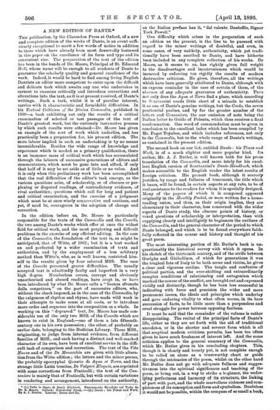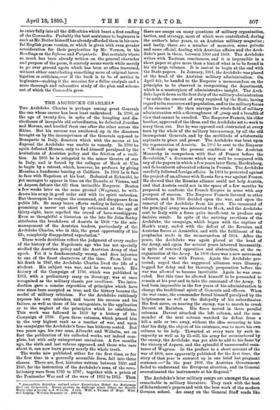A NEW EDITION OF DANTE.* THE publication, by the Clarendon
Press at Oxford, of a new and complete edition of the works of Dante, is an event suffi- ciently exceptional to merit a few words of notice in addition to those which have already been most deservedly bestowed in this paper on the excellence of its form and type and its convenient size. The preparation of the text of the edition has been in the hands of Dr. Moore, Principal of St. Edmund Hill, whose name will be enough to all students of Dante to guarantee the scholarly quality and general excellence of the work. Indeed, it would be hard to find among living English Dantists an editor more competent to enter upon the difficult and delicate task which awaits any one who undertakes in earnest to examine critically and introduce corrections and alterations into the text, as it is at present received, of Dante's writings. Such a task, whilst it is of peculiar interest, carries with it characteristic and formidable difficulties. In his Textual Criticism of the Diving Commedia, published in 1889—a book exhibiting not only the results of a critical examination of selected or test passages of the text of Dante's greatest work, but the curiously instructive process by which such results were attained—Dr. Moore has given an example of the sort of work which underlies, and has practically been a preparation for, his present edition. The mere labour implied in such an undertaking is by no means inconsiderable. Besides the wide range of knowledge and experience which is needed as a primary qualification, there is an immense mass of critical work which has accumulated through the labours of successive generations of editors and commentators, which must be gone into and sifted, if only that half of it may be set aside as of little or no value. And it is only when this preliminary work has been accomplished that the real difficulties of the editor's task emerge, as the various questions arise, of scholarship, or of obscure or per- plexing or disputed readings, of contradictory evidence, of rival authorities ; questions which call for long and patient and critical examination, and the exercise of a judgment which must be at once wisely conservative and cautious, and yet, if need be, courageous in the adoption of change and correction.
In the edition before us, Dr. Moore is particularly responsible for the texts of the Commedia and the Convito, the two among Dante's works which offer at once the widest field for critical work, and the most perplexing and difficult problems in the exercise of any efficient editing. In the case of the Commedia, the foundation of the text is, as might be anticipated, that of Witte, of 1862 ; but it is a text worked on and perfected by a wider examination of texts and authorities, and by the employment of a less arbitrary method than Witte's, who, as is well known, restricted him- self to the results given by four selected MSS. The case of the Convito presented graver difficulties. The usually accepted text is admittedly faulty and imperfect in a very high degree. Numberless errors, corrupt and obviously unauthorised and absurd readings, have crept in, or have been introduced by what Dr. Moore calls a " licenza sfrenata della eongettura " on the part of successive editors, who, without the check imposed, as in the case of the Commedia, by the exigences of rhythm and rhyme, have made wild work in their attempts to make sense at all costs, or to introduce more order and sequence into the composition as a whole. In working on this " depraved" text, Dr. Moore has made con- siderable use of the only two MSS. of the Convito which are known to exist in England,—one of them a late fifteenth- century one in his own possession ; the other, of probably an earlier date, belonging to the Bodleian Library. These MSS., originating, to judge from internal evidence, from different families of MSS., and each having a distinct and well-marked character of its own, have been of excellent service in the diffi- cult task of comparison and correction. The text of the Vita Nuova and of the De Monarchia are given with little altera- tion from the Witte edition ; the letters and the minor poems, the probably apocryphal Qucestio de Aqua et Terra, and the strange little Latin treatise, De Vulgari Eloquio, are reprinted with some corrections from Fraticelli ; the text of the Can- zoniere is mainly that of Fraticelli, but with certain variations in rendering and arrangement, introduced on the authority, • (L) Tufts is Opeve di Dante Jili9hieri. Nuovamente Birednte nel Testo da Dr. E. Moore. Oxford : University Preas.--(2.) Dante : his Times and Work. By A. J. Butler. London: Inner and Oo.
as the Italian preface has it, " dal valente Dantofilo, Signor York Powell."
One difficulty which arises in the preparation of such an edition as the present, is the line to be pursued with regard to the minor writings of doubtful, and even, in some cases, of very unlikely, authenticity, which yet tradi- tionally have been ascribed to Dante, and have hitherto been included in any complete collection of his works. Dr Moore, as it seems to us, has rightly given fall weight to the disadvantages and inconveniences which would be incurred by enforcing too rigidly the results of modern destructive criticism. He gives, therefore, all the writings which have been generally attributed to Dante, although with an express reminder in the case of certain of them, of the absence of any adequate guarantee of authenticity. Thee not only does the Aqua et Terra find a place, which according to S•.artazzini needs little short of a miracle to establish it as one of Dante's genuine writings, but the Credo, the seven penitential psalms, and by far the greater number of the letters and Canzoniere, the one omission of note being the Italian letter to Guido of Polenta, which thus receives a final condemnation. One word of commendation must be given in conclusion to the excellent index which has been compiled by Mr. Paget Toynbee, and which includes references, not only to the Commedia, but to the whole range of Dante's writings, as contained in the present edition.
The second book on our list, entitled Dante : his Times and Work, is of a much slighter and more popular kind. Its author, Mr. A. J. Butler, is well known both for his prose translation of the Commedia, and more lately for his excel- lent English version of Scartazzini's Dante-Handbuch, which makes accessible to the English reader the latest results of foreign criticism. His present book, although it scarcely justifies, by range and fullness of treatment, the title which it bears, will be found, in certain aspects at any rate, to be of real assistance to the readers for whom it is specially designed. Many of the papers of which it is composed appeared originally in the Monthly Packet, or were written for a home- reading union, and thus, as their origin implies, they are elementary in their character, less concerned with the wider aspects of Dante study, the obscure points of history, or vexed questions of scholarship or interpretation, than with supplying clearly and intelligibly to beginners the outlines of the Commedia, and the general character of the period to which Dante belonged, and which is to be found everywhere faith- fully reflected in the course and history and thought of his great poem.
The most interesting portion of Mr. Butler's book is un- questionably the historical survey with which it opens. In his sketch of the thirteenth century, and of the strife between Guelphs and Ghibellines, of which for generations it was the tragical fate of Italy to be both scene and victim, he gives a clear and vigorous outline. The tangle and confusion of political parties, and the ever-shifting and extraordinarily complex conditions of relationship and antagonism which marked the course of the conflict, are brought out and expressed vividly and distinctly, though he has been less successful in indicating with force and precision the wider and more permanent issues, the ideals and principles which underlay and gave enduring vitality to what often seems, in its bare succession of facts, to be little more than a purposeless and cruel struggle for power between opposing factions.
It must be said that the remainder of the volume is rather disappointing. The recital of the principal facts of Dante's life, either as they are set forth with the aid of traditional anecdotes, or in the shorter and severer form which is all that sceptical modern criticism permits, has been too often given to have much freshness of interest left. And the same criticism applies to the general summary of the Commedia, which Mr. Butler gives in his concluding chapters. This, though it is clearly and tersely put, is not complete enough to be relied on alone as a trustworthy chart or guide through the intricacies of the poem, whilst on the other hand Mr. Butler does not go with adequate fullness and sugges- tiveness into the spiritual significance and teaching of the poem, or bring out, in a way to strike a beginner, the under- lying perfectness and harmony of its structure, the linking of part with part, and the whole marvellous richness and com- pleteness of its conception and form and symbolism. Doubtless it would not be possible, within the compass of so small a book,
to enter fully into all the difficulties which beset a first reading of the Commedia. Probably the best assistance to beginners is such as Mr. Butler himself has already afforded them in his care- ful English prose version, or which is given with even greater consideration for their perplexities by Mr. Vernon, in his Readings on the Inferno and Purgatorio. But certainly where so much has been already written on the general character and purpose of the poem, it scarcely seems worth while merely to go over ground again which has been so often traversed, without either contributing something more of original inves- tigation or criticism,—or if the book is to be of service to beginners—making it the occasion for a fuller analysis and a more thorough and exhaustive study of the plan and scheme out of which the Commedia grew.



































 Previous page
Previous page